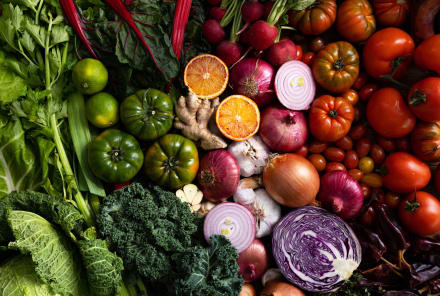Advertisement
These Are The Best Foods To Eat When You're Stressed, Says A Dietitian


When her father was diagnosed with pancreatic cancer, registered dietitian and mbg Collective member Jess Cording, R.D., CDN, developed a taste for butter. "For some reason, one of the foods I really wanted to eat all the time was radishes cooked in butter," she says on this episode of the mindbodygreen podcast.
"It was the most random thing." She adds that it's a common physiological response to crave high-fat, high-energy foods when stressed (so her affinity for butter made perfect sense), and your body may physically crave certain nutrients when faced with emotional hardship.
Cording's newest book, The Farewell Tour: A Caregiver's Guide to Stress Management, Sane Nutrition, and Better Sleep, is a great resource for those struggling with terminal illness in their families—it's an incredibly moving must-read—and in our podcast interview, she does touch on how she used food to nurture her physical and mental health.
"Having a balance of protein, fat, [and] complex carbohydrates spread through the day, limiting sugar…those things were huge for me," she says. In terms of specific foods, though, Cording has a few standouts. Find them below:
Berries
"I really got into frozen berries," says Cording. "I think I was just craving the antioxidants." See, berries are chock-full of potent antioxidants called polyphenols. A 2017 clinical trial even found that the flavonoids (a group of polyphenols) in wild blueberries were associated with improved positive mood—both kids and adults reported a brighter mood two hours after intake1.
Plus, berries are high in vitamin C, which can play a role in stabilizing cortisol levels. Specifically, research has found that adrenal glands have high concentrations of vitamin C2, and eating these foods can feed the adrenal glands and keep cortisol levels balanced. As for Cording's choice to eat them frozen? Well, they're just easier to store that way.
Omega-3s
You might already be familiar with the brain benefits of omega-3 fatty acids, but did you know that consuming enough omega-3 fatty acids can actually help stimulate your vagus nerve (which, in turn, helps you handle stressors better)? According to a 2011 Frontiers in Physiology scientific review3, omega-3s can help increase vagal tone and support a healthy parasympathetic nervous response by playing a key role in regulating heart rate variability (HRV).
It's no wonder, then, that "some of the specific foods I was craving were sardines packed in olive oil," Cording notes. (A snack rich in omega-3s!) "I couldn't stop eating them." Sardines are an excellent source of vitamin B12, minerals, and calcium, if you choose to eat the bones. "Those omega-3s are so soothing to our nervous systems, and the olive oil, also, has so many antioxidants and healthy fats," Cording previously told mbg about the healthiest fish to eat.
Fermented foods
Any gut-healthy food is also simultaneously brain-healthy, thanks to the gut-brain connection or gut-brain axis4. The gut directly affects the brain, so Cording favors "a lot of fermented foods [and] prebiotic-rich foods" to help balance her stress levels.
Fermented foods—think sauerkraut, kefir, and kimchi—naturally contain probiotics and prebiotic fiber, and probiotics have been shown to bolster the stress response in people, due to the aforementioned gut-brain axis5.
The takeaway
When faced with an emotional or physical stressor, your body may crave certain nutrients. Of course, it's important to honor your cravings, whatever they might be—if you'd like to indulge in a decadent treat every once in a while, please do so.
Cording agrees, but she also recommends getting curious about those urges: "I do encourage thinking about what specifically about that food is appealing," she says. "Is it a texture, is it a flavor, or is there a nutrient in there that you really need? That can give you some clues [for] healthier versions you might consider having to satisfy that craving."
We hope you enjoy this episode! And don't forget to subscribe to our podcast on iTunes, Google Podcasts, Spotify, or Amazon Music!

Which Is Healthier: One Drink Daily Or A Few Drinks On The Weekend?
Molly Knudsen, M.S., RDN

Women Are 2X More Likely To Deal With This Common Issue Than Men
Gretchen Lidicker, M.S.

Which Is Healthier: One Drink Daily Or A Few Drinks On The Weekend?
Molly Knudsen, M.S., RDN

Women Are 2X More Likely To Deal With This Common Issue Than Men
Gretchen Lidicker, M.S.

Which Is Healthier: One Drink Daily Or A Few Drinks On The Weekend?
Molly Knudsen, M.S., RDN

Women Are 2X More Likely To Deal With This Common Issue Than Men
Gretchen Lidicker, M.S.

Do Women Have A Peak Exercise Window? New Research Reveals The Truth
Molly Knudsen, M.S., RDN

Which Is Healthier: One Drink Daily Or A Few Drinks On The Weekend?
Molly Knudsen, M.S., RDN

Women Are 2X More Likely To Deal With This Common Issue Than Men
Gretchen Lidicker, M.S.

Do Women Have A Peak Exercise Window? New Research Reveals The Truth
Molly Knudsen, M.S., RDN













